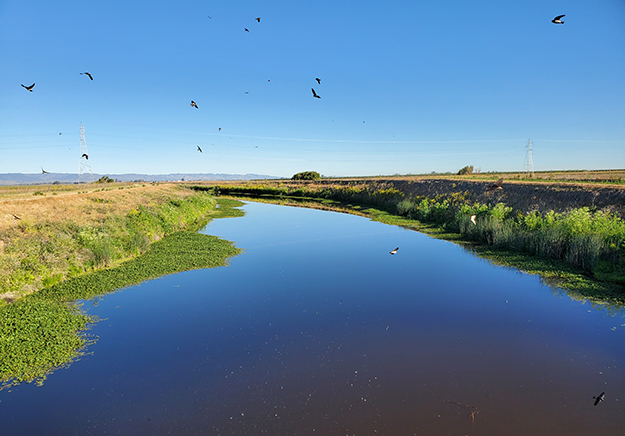Guest Author: Melissa Turner, Delta Regional Monitoring Program
The Delta Regional Monitoring Program (DRMP) is a stakeholder-directed program formed to collect water quality data necessary for improving our understanding of Delta water quality issues. Established to improve understanding of water quality and ecosystem health, DRMP serves as a collaborative forum where state, local, and federal agencies, along with scientific experts and stakeholders, can come together to share data and advance common goals.

Who We Are and Our Mission
The DRMP was founded with the goal of supporting management decisions through robust, scientifically-sound monitoring efforts. Our mission is to provide high-quality data and analysis that informs policy makers, resource managers, and stakeholders about the state of the Delta’s water quality. This is achieved through collaborative partnerships, transparent sharing of data, and the implementation of monitoring strategies designed to assess the Delta’s unique challenges.
At the core of our program is a commitment to provide actionable insights and foster scientific collaboration. We aim to ensure that our work directly supports the needs of decision makers who are striving to balance the ecological health of the Delta with human needs, such as agriculture, urban water use, and recreation.
Our Key Work Products
Our work is centered around developing and implementing comprehensive monitoring plans that track important water quality indicators in the Delta. Some of our key work products can be found on the DRMP website and include:
- Water Quality Monitoring Reports: These reports compile the data collected from various monitoring efforts across our regular monitoring sectors, including current use pesticides and toxicity, constituents of emerging concern, nutrients, and mercury. These reports are shared publicly to ensure transparency and to support informed decision-making.
- Special Studies: In addition to regular monitoring, the DRMP also undertakes special studies that address emerging issues in the Delta, such as harmful algal blooms (HABs), nutrient loading, constituents of emerging concern, and the impacts of climate change on water quality.
- Data Sharing Initiatives: Data accessibility is a priority for DRMP. We provide stakeholders with access to our data through publicly available platforms. This enables scientists, resource managers, and the public to engage with the information and apply it in their own work.
Exciting New Developments: Nutrient Multi-Year Study Plan
As we move into the next chapter of our work, we are particularly excited about the ongoing development of the Nutrient Multi-Year Study Plan. This ambitious effort aims to provide a comprehensive understanding of how nutrients affect water quality in the Delta, particularly in relation to HABs and other ecosystem impacts.
The Nutrient Multi-Year Study Plan represents a significant step forward in addressing one of the most pressing water quality concerns in the Delta. Through rigorous scientific analysis, the plan will help to identify priority areas for monitoring, management, and mitigation efforts. It will also offer guidance for future regulatory actions, making it a critical tool for safeguarding the Delta’s water quality in the face of increasing stressors.
Collaboration with Key Partners: Strengthening Science and Policy Integration
A key feature of the DRMP is its strong emphasis on collaboration. The Central Valley Regional Water Quality Control Board (CVRWQCB) has been a key partner since the initiation of the DRMP and continues to be an active participant and contributor. We work closely with a range of partner programs to ensure that our efforts are aligned with broader goals and strategies. Some of the key partners include:
- Delta Science Program: Our collaboration with the Delta Science Program helps to integrate the latest scientific research into our monitoring and reporting activities. This ensures that our work is based on the most up-to-date understanding of the complex Delta ecosystem.
- State Water Resources Control Board / Surface Water Ambient Monitoring Program (SWAMP): Through our partnership with the State Board and SWAMP, we help ensure that the data we collect is used to support statewide water quality management efforts. This collaboration strengthens the connection between local monitoring and state-level policy decisions.
- Interagency Ecological Program (IEP): The IEP has been a vital partner in our efforts to understand the complex interactions between water quality and ecological health. By working closely with the IEP, we will be able to incorporate ecological indicators into our monitoring framework, providing a more holistic view of the Delta’s health.
In addition to state and local partners, the DRMP works closely with federal agencies like the Environmental Protection Agency (EPA), the U.S. Fish and Wildlife Service (FWS), the United States Geological Services (USGS) to enhance water quality monitoring and ecosystem protection efforts. These partnerships ensure that DRMP’s efforts are in line with national standards, while addressing the unique needs of the Delta region.
Looking Ahead: The Future of DRMP
As the DRMP looks to the future, we are enthusiastic about the opportunities to continue expanding our work and deepening our collaborations. We are particularly excited about the potential for even greater collaboration with our partners. Together, we can drive forward new research, expand our monitoring network, and develop innovative strategies to address the Delta’s most pressing challenges.
Come check us out at the upcoming Bay-Delta Science Conference (September 30 through October 2, 2024) where we will be moderating a session titled “Collaborative Monitoring and Research: Advancing Nutrient and Algal Bloom Understanding in the Bay Delta” on October 2 with presentations by USGS and DWR. This session will be particularly valuable for researchers, policymakers, and community stakeholders interested in the intersection of environmental monitoring, resource management, and collaborative planning.
As we move into this next chapter, we invite all stakeholders—whether you’re a policymaker, scientist, or concerned citizen—to engage with the DRMP. The Delta is a shared resource, and through continued collaboration, we can ensure its health and resilience for generations to come.




